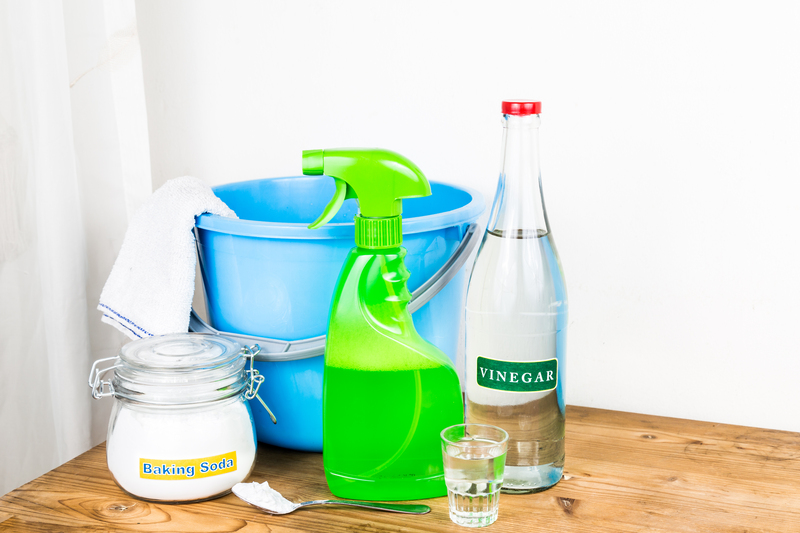Say Goodbye to Pet Odor for a Fresher Home
Posted on 06/06/2025
Say Goodbye to Pet Odor for a Fresher Home
If you adore your pets but struggle with persistent pet odor, you're not alone. Pet smells can sneak into your furniture, carpets, and air, making your home feel less fresh. The good news? There are effective solutions for eliminating pet odor and restoring a invigorating, clean environment. In this comprehensive guide, we'll explore the best ways to get rid of pet odor for good, ensuring your home always smells inviting.
Understanding the Causes of Pet Odor
Before tackling pet odor removal, it's important to understand where these unpleasant smells originate. Pets have natural oils, they may have accidents, and their fur traps dirt and bacteria. Here are the most common sources:
- Pet urine accidents (on carpet, rugs, furniture)
- Litter box smells that linger in the air
- Wet dogs or damp pet fur after outside play
- Pet bedding that hasn't been cleaned
- Trapped pet hair and dander in cushions and soft surfaces
- Pet breath or ear infections
- Poor ventilation in spaces your pets frequent
Why Do Pet Odors Linger?
Pet odor molecules are particularly sticky. Pet urine, for example, contains uric acid crystals that bond to fibers and surfaces. These can be incredibly tough to eliminate with standard cleaning. Moreover, these smells can attract your pet back to the same spot, causing recurring issues.

Effective Strategies to Remove Pet Odor from Your Home
To eliminate pet odors permanently, you'll need a multi-pronged approach. Below are several steps you can use to ensure your home smells continuously fresh--no matter how many furry friends share your space!
1. Start With Pet Hygiene
- Regular Baths: Wash your dog or cat with a gentle pet shampoo at least once a month. This removes oils and dirt that contribute to odor.
- Frequent Grooming: Brush out loose fur and dander that can stick to furniture and carpets.
- Dental Care: Don't forget pet teeth--poor oral hygiene can cause persistent mouth odor. Use vet-approved dental treats or regular brushing.
- Ear Cleaning: Check for wax buildup or infections that may generate unpleasant smells.
2. Clean Pet Bedding and Accessories Often
Pet beds, blankets, and toys absorb smells over time. To keep your home odor free:
- Wash pet bedding and toys weekly in hot water with pet-safe detergent.
- If the stuffing is saturated, consider replacing the bedding.
- For tough odors, add a half-cup of white vinegar to the wash cycle.
3. Address Accidents Immediately
Urine and feces accidents are leading causes of strong pet odors. The faster you react, the easier cleanup will be.
- Blot up liquids right away with paper towels--do not rub.
- Rinse the area with cool water to dilute urine or feces residue.
- Use an enzyme-based cleaner designed for pets. These break down odor-causing proteins and uric acid crystals. Do not use ammonia-based products, as ammonia can mimic the scent of urine and encourage repeated accidents.
- Allow the area to dry fully. For deep penetration, you may need a wet vacuum.
4. Deodorize Carpets and Upholstery
Since pet odors love to hide in soft surfaces, it's essential to regularly clean carpets and furniture:
- Vacuum daily with a HEPA filter to pick up dander, hair, and dirt.
- Apply baking soda to carpets and let it sit overnight before vacuuming--baking soda is a natural odor absorber.
- Have carpets professionally deep cleaned every 6-12 months.
- Consider a steam cleaner for stubborn smells embedded in fibers.
5. Manage Litter Box Odors
If you're a cat owner, a foul-smelling litter box may be the culprit behind persistent bad smells. Here's how to keep it fresh:
- Scoop waste at least once daily (twice is better!)
- Completely change litter and wash the box with hot, soapy water weekly.
- Use unscented, high-absorbency litter to lock in odors
- Try a litter box deodorizer or sprinkle baking soda at the bottom
- Place the box in a well-ventilated spot away from major living areas
6. Improve Air Quality
Sometimes pet odors linger in the air, regardless of your efforts. Help purify the air with these tips:
- Open windows regularly to ensure proper airflow and minimize stuffiness
- Use HEPA air purifiers in rooms where pets spend most of their time
- Try natural air fresheners like simmering vinegar and citrus peels, or use essential oil diffusers (with pet-safe oils)
- Replace HVAC filters every 2-3 months to remove trapped dander and dust
7. Treat Hard Surfaces and Frequent Touch Points
Don't forget about hard floors, walls, and doors--particularly near pet feeding or sleeping areas.
- Mop floors with a pet-safe disinfectant; vinegar and water mix works for most surfaces
- Wipe down baseboards, doors, and walls regularly to prevent odor buildup
- Clean food and water bowls daily
Natural Remedies to Combat Pet Odors
If you prefer environmentally friendly solutions, several natural remedies provide excellent pet odor elimination without harsh chemicals:
- Vinegar: Neutralizes odors and works well for cleaning surfaces and fabrics (always test in inconspicuous areas first).
- Baking Soda: Sprinkle on furniture and carpets, let it sit, then vacuum up. Highly effective for absorbing unwanted smells.
- Lemon Juice: Natural deodorant with antibacterial properties; combine with water in a spray bottle for quick use.
- Activated Charcoal: Place in small bowls near pet areas to passively absorb odors from the air.
Must-Have Products for Pet Odor Control
While natural solutions are helpful, sometimes you need something stronger. Here are the best pet odor removers and tools to consider:
- Enzyme-based cleaners: Target urine, feces, vomit, and drool with effective biological action
- HEPA Air Purifiers: Trap dander and allergens to keep air fresh and clean
- Odor-eliminating sprays: Great for "in-between" cleaning--for textile surfaces, use products safe for pets
- Steam cleaners: Deep clean floors, furniture, and drapes to remove entrenched smells
- Pee pads and waterproof covers: For training puppies or elderly pets who may have frequent accidents
Preventing Future Pet Odors
The best way to maintain a fresh home is through preventive care for pet odor. Consistency is key!
- Establish a regular cleaning routine for all pet-accessed areas
- Train pets to avoid problem areas (like bedroom carpets or expensive rugs)
- Get regular vet checkups--unexpected odors may signal health issues
- Feed pets high-quality food for optimum digestion and minimal waste odor
Pet Owner's Quick Checklist for Lasting Freshness
- Bathe and groom your pets on a schedule
- Wash bedding, toys, and accessories weekly
- Attend to pet accidents immediately with proper cleaners
- Vacuum and dust frequently in every pet-friendly zone
- Use air purifiers and open windows for fresh air flow
- Debate natural vs. commercial odor removers and find what works best for your home

Frequently Asked Questions About Managing Pet Odors
How often should I deep clean my home if I have pets?
For an odor-free home, deep clean high-traffic pet areas at least once a month. Fabrics and carpets should ideally be cleaned bi-monthly for best results.
Are air fresheners safe for pets?
Many commercial air fresheners contain chemicals harmful to animals. Use them cautiously, and always choose pet-safe products. Natural alternatives like baking soda or activated charcoal are safer options.
What should I do if pet odor persists despite cleaning?
Persistent odors may be trapped beneath floorboards, inside walls, or in HVAC systems. Hire a professional cleaner if needed, and consult your vet to rule out any health issues causing strong smells.
Can diet affect pet odor?
Absolutely! Low-quality food, certain medications, or digestive problems can increase body odor and waste smell. Consult your vet about dietary improvements for your pet.
What is the best pet odor eliminator?
Enzyme-based cleaners are considered the best pet odor removal solution as they break down odor-causing molecules at the source. Combine these with regular housecleaning for optimal effect.
Conclusion: Enjoy a Fresher, Odor-Free Home With Your Pets
Sharing your home with beloved animals doesn't have to mean tolerating unwanted smells. By understanding the sources of pet odor, adopting a layered pet odor control strategy, and using safe, effective cleaning solutions, you can enjoy a home that's both cozy and fresh smelling. Embrace these proven tips and both you and your pets will benefit from a cleaner, healthier environment.
Are you ready to say goodbye to pet odor for a fresher home? Begin implementing these strategies today, and reclaim the pristine living space both you and your furry companions deserve!




